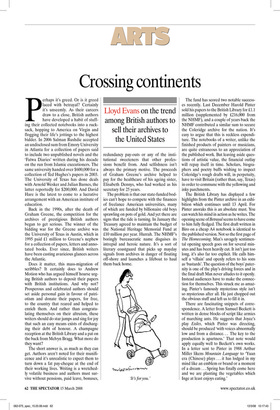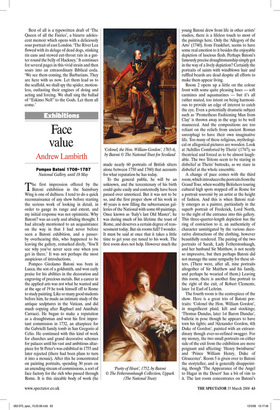Crossing continents
Lloyd Evans on the trend among British authors to sell their archives to the United States
Perhaps it’s greed. Or is it greed laced with betrayal? Certainly it’s unseemly. As their careers draw to a close, British authors have developed a habit of stuffing their collected notebooks into a rucksack, hopping to America on Virgin and flogging their life’s jottings to the highest bidder. In 2006 Salman Rushdie accepted an undisclosed sum from Emory University in Atlanta for a collection of papers said to include two unpublished novels and the ‘Fatwa Diaries’ written during his decade on the run from Islamic executioners. The same university handed over $600,000 for a collection of Ted Hughes’s papers in 2003. The University of Texas has done deals with Arnold Wesker and Julian Barnes, the latter reportedly for $200,000. And David Hare is the latest to come to a lucrative arrangement with an American institute of education.
Back in the 1990s, after the death of Graham Greene, the competition for the archives of prestigious British authors began to get serious. The winner of the bidding war for the Greene archive was the University of Texas in Austin, which in 1995 paid £1 million to Greene’s nephew for a collection of papers, letters and annotated books. Ever since, British writers have been casting avaricious glances across the Atlantic.
Does it matter, this mass-migration of scribbles? It certainly does to Andrew Motion who has argued himself hoarse urging British authors to deposit their papers with British institutions. And why not? Prosperous and celebrated authors should set aside personal gain in favour of patriotism and donate their papers, for free, to the country that reared and helped to enrich them. And rather than congratulating themselves on their altruism, these writers should do star jumps and sing for joy that such an easy means exists of discharging their debt of honour. A champagne reception at the British Library and a pat on the back from Melvyn Bragg. What more do they want?
The short answer is, as much as they can get. Authors aren’t noted for their munificence and it’s unrealistic to expect them to turn down a fat pay-cheque at the end of their working lives. Writing is a wretchedly volatile business and authors must survive without pensions, paid leave, bonuses, redundancy pay-outs or any of the institutional sweeteners that other professions benefit from. And selfishness isn’t always the primary motive. The proceeds of Graham Greene’s archive helped to pay for the healthcare of his ageing sister, Elisabeth Dennys, who had worked as his secretary for 25 years.
The problem is that our state-funded bodies can’t hope to compete with the finances of freelance American universities, many of which are funded by billionaire old boys sprawling on pots of gold. And yet there are signs that the tide is turning. In January the Treasury agreed to maintain the budget of the National Heritage Memorial Fund at £10 million per year. Hurrah. The NHMF’s boringly bureaucratic name disguises its intrepid and heroic nature. It’s a sort of literary coastguard that picks up mayday signals from archives in danger of floating off-shore and launches a lifeboat to haul them back home. The fund has scored two notable successes recently. Last December Harold Pinter sold his papers to the British Library for £1.1 million (supplemented by £216,000 from the NHMF), and a couple of years back the NHMF contributed a similar sum to secure the Coleridge archive for the nation. It’s easy to argue that this is reckless expenditure. The notebooks of a writer, unlike the finished products of painters or musicians, are quite extraneous to an appreciation of the published work. But leaving aside questions of artistic value, the financial outlay will repay itself in time. Scholars, biographers and poetry buffs wishing to inspect Coleridge’s rough drafts will, in perpetuity, have to visit Britain (rather than, say, Texas) in order to commune with the yellowing and inky parchments.
The British Library has displayed a few highlights from the Pinter archive in an exhibition which continues until 13 April. For Pinter anoraks this is an absolute must. You can watch his mind in action as he writes. The opening scene of Betrayal seems to have come to him fully fledged. The first draft written in Biro on a cheap A4 notebook is identical to the published version. Not so the first page of The Homecoming. Max’s savagely sentimental opening speech goes on for several minutes and has been heavily cut. It isn’t just too long, it’s also far too explicit. He calls himself a ‘villain’ and openly refers to his sons as ‘bastards’. The question of the boys’ paternity is one of the play’s driving forces and in the final draft Max never alludes to it openly. Instead audiences have to make the connection for themselves. This struck me as amazing. Pinter’s famously mysterious style isn’t so mysterious after all. He just chopped out the obvious stuff and left us to fill it in.
There are fascinating snippets of correspondence. A letter from Samuel Beckett is written in dense blocks of script like armies of marching ants. He suggests that Joyce’s play Exiles, which Pinter was directing, should be produced ‘with voices abnormally low and from a distance... The key to the production is apartness.’ That note would apply equally well to Beckett’s own works. In a letter sent to Pinter in 1988 Arthur Miller likens Mountain Language to ‘Yuan era (Chinese) plays ... it has lodged in my mind like an emblem or brand or a moment of a dream ... Spring has finally come here and we are planting the vegetables which Inge at least enjoys eating.’ Best of all is a typewritten draft of ‘The Queen of all the Fairies’, a bizarre adolescent memoir which opens with a deliciously sour portrait of east London. ‘The River Lea flowed with its deluge of dead dogs, stinking tin cans and stewed cut-throat rats in a gutter round the belly of Hackney.’ It continues for several pages in this vivid strain and then soars into an extraordinary Biblical coda. ‘We see them coming, the Barbarians. They are here with us now. Let them lead us to the scaffold, we shall spy the spider, motionless, outlasting their engines of doing and acting and forcing. We shall sing the ballad of “Eskimo Nell” to the Gods. Let them all come.’



























































































 Previous page
Previous page